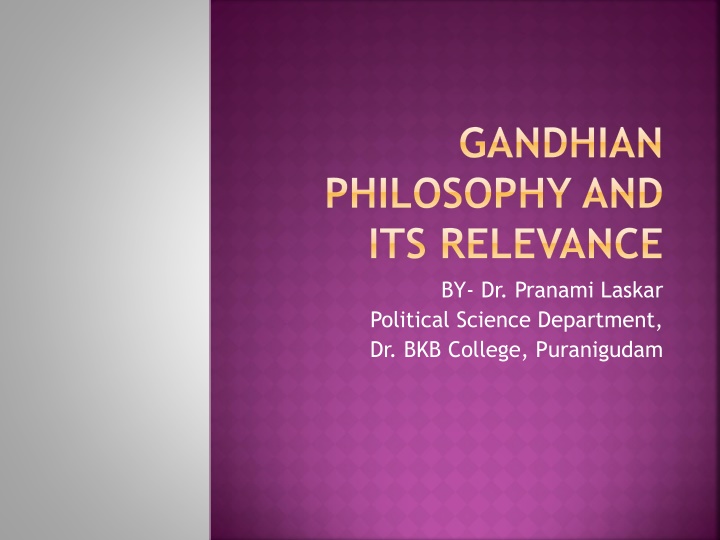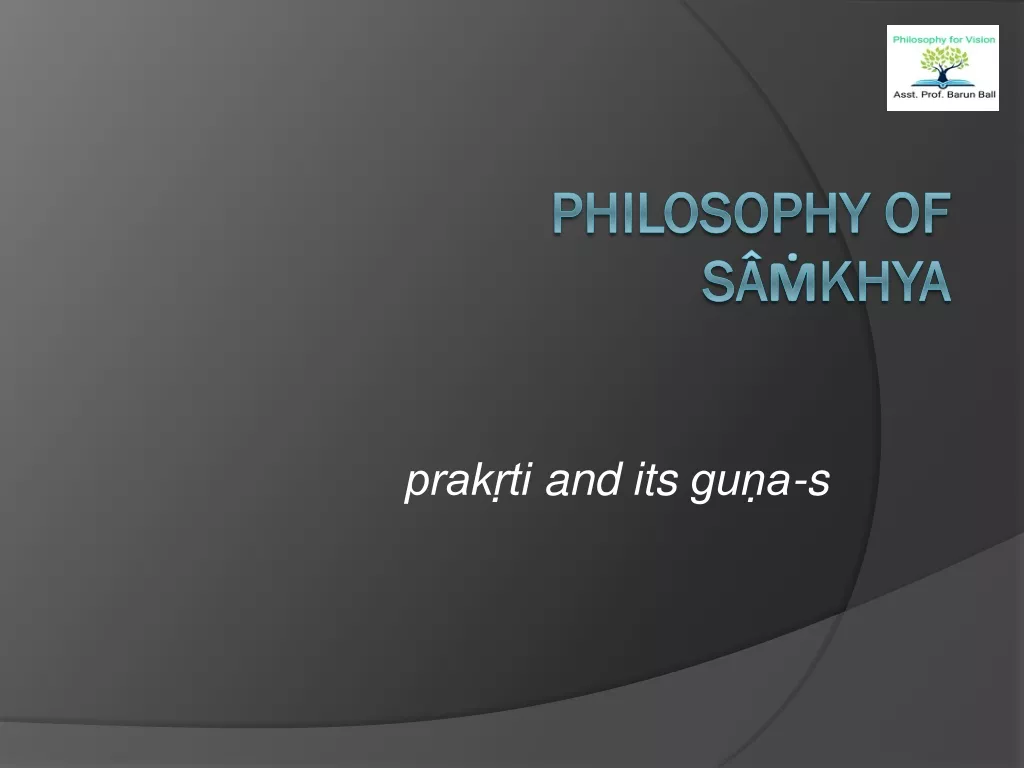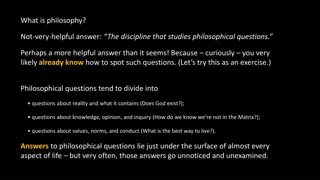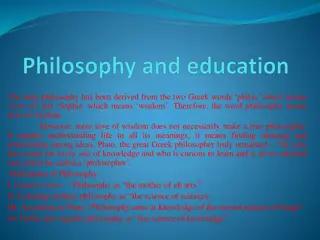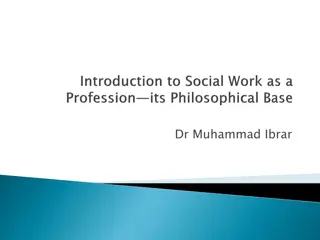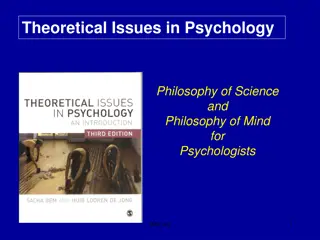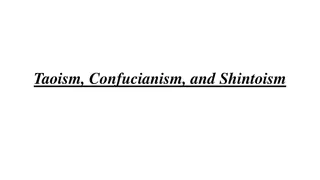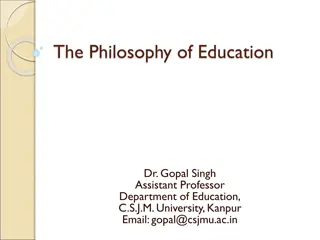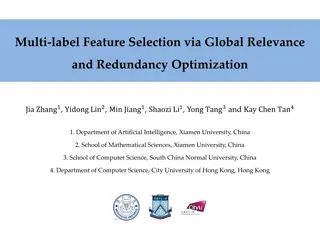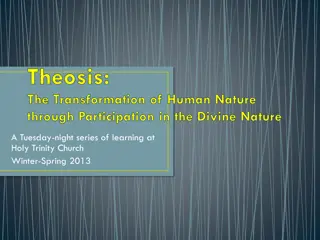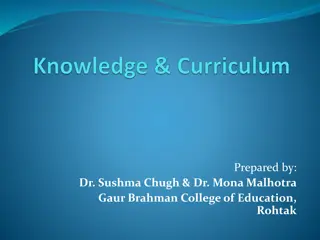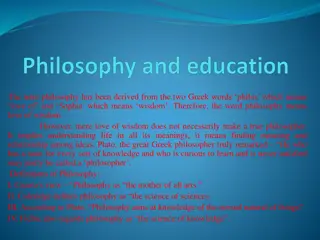Gandhian Philosophy and Its Relevance in Modern Times
Mahatma Gandhi's unique philosophy, rooted in non-violence and moral progress, shaped India's direction. Explore how Gandhian ideas influenced societal, political, and moral insights, promoting peace and truth. Gandhi's holistic approach intertwined religion and politics, advocating for a society based on inner purity and non-violent resistance. Learn about Satyagraha, his powerful tool for righteous political action.
Download Presentation

Please find below an Image/Link to download the presentation.
The content on the website is provided AS IS for your information and personal use only. It may not be sold, licensed, or shared on other websites without obtaining consent from the author.If you encounter any issues during the download, it is possible that the publisher has removed the file from their server.
You are allowed to download the files provided on this website for personal or commercial use, subject to the condition that they are used lawfully. All files are the property of their respective owners.
The content on the website is provided AS IS for your information and personal use only. It may not be sold, licensed, or shared on other websites without obtaining consent from the author.
E N D
Presentation Transcript
GANDHIAN PHILOSOPHY AND ITS RELEVANCE BY- Dr. Pranami Laskar Political Science Department, Dr. BKB College, Puranigudam
INTRODUCTION: Mahatma Gandhi was an excellent human being. Gandhi was the greatest man that India presented to the world in modern times. Gandhi s philosophy and ideas were so unique that those ideas shaped and led our country to a proper direction. He is rightly said as the father of the nation and a role of a father in the country s fate is always relevant. Gandhi was one of the foremost champions of democratic ideas.
GANDHIAN PHILOSOPHY: Gandhian philosophy is significant for the moral, sociological and political insights. Gandhi always dreamt for a non-violent society where only peace prevails. In fact he was an absolute pacifist. According him, moral progress of an individual is more important than material progress. He wanted to establish a welfare state which he named as RamRajya which would be dominated by truth, ahimsa and freedom. He also wanted to abolish state by means of Satyagraha or non-violent means. In fact he wanted to establish a new society.
Gandhis whole political philosophy was the natural consequence of his religious and moral philosophy. Gandhi attempted to apply moral and ethical truths to the facts of social and political life. He believed that religion and politics must go hand in hand. For Gandhi Politics was a part of man s life. Gandhi viewed that political activity of man is closely related to the other activities of man and all these activities influence each other. Gandhi never separated politics from other walks of life. He was always against of concentration of power in political field. He also opposed the use of violence or force associated with political power. Mahatma Gandhi adopted for a village based political formation fostered by a classless, stateless society . According to him freedom can be obtained through a process of inner purification. We have divided the political philosophies of Mahatma Gandhi into some parts. We are going to briefly discuss those parts below.
Satyagraha: Satyagraha is Gandhi s ultimate contribution to the modern political philosophy. Satyagraha is the chief weapon of Gandhian political action that has been defined as the soul force by him. Satyagraha means resistance but is different from passive resistance. It is actually active resistance, acting on the path of truth. Gandhi regarded Satyagraha as inherent and birthright and a moral prerogative of a human being. It is an ideal weapon of war of righteousness. Explaining the working of Satyagraha as a political weapon Gandhi has insisted that it is based on truth and non- violence. It simply means adhering to truth at any circumstances. According to Gandhi Satyagraha is the most powerful weapon for fighting against imperialism or a powerful enemy. Satyagraha includes non violent pressure tactics such as agitation, demonstration, picketing, dharna, economic boycott, nonpayment of taxes, non co operation etc.
Non-violence: Gandhi was an ardent believer of non-violence or ahimsa. It means in negative sense no injury either in words or deeds and love for others in a positive sense. According to him, one should be non-violent both in thought and action. He viewed that truth can be only realized through ahimsa. He saw truth and non- violence as the two sides of the same coin . Gandhi s technique of non-violence was aimed at promoting social change. In present day context, if we look at the international relations of the countries we will see that countries are often using violent means to achieve their goal. In fact if we look at the nature of international terrorism, all terrorist groups are becoming so brutal and they are violating human rights of the people. Therefore if we abide by the non-violent principle of Mahatma Gandhi, then we can imagine for a world where only peace prevails
Ideal state: Gandhi very firmly believed that the state was an instrument of coercion. Gandhi depicted the idea of a society in Hind Swaraj where every individual was the master of his own destiny. Like the classical liberals Gandhi favored state with least function. He advocated that the Government ought to rule the most minimum. He rejected the concept of absolute state. But he did not want to abolish the institution of state altogether. He thought that the state, though an oppressive instrument, had utility for the individual. Therefore state according to him is a necessary institution though evil as well.
RAM RAJYA: Gandhi wanted to build an ideal society as well as a ideal polity which what he called as Ramrajya . Gandhi was a practical realist. Among his various ideals his concept of Ram Rajya is an important one. This is the ideal state laid down by him before the country. By Ram Rajya Gandhi did not mean the Rajya or state of any particular person. In this ideal state the people will be their own sovereign. They will be self- disciplined, truthful and non violent. Ram for Gandhi was a personification of virtue. Ram Rajya for Gandhi stood for noble conduct, self-restraint, popular administration and public happiness. It would not be a caste- ridden society and it will be a society of economic equality. In the society based on Ram Rajya there will be no conflicts and no tensions and everybody would earn an honest living. It was the ideal of a perfect society as Gandhi looked at it. It was more a society than a state. The concept of Ram Rajya is not merely a political ideal but also represents the rule of the moral spirit. For the establishment of a Ram Rajya Gandhi wanted the intensification of moral will. Whether the ideal of Ram Rajya is practicable or not it depends on the belief system of the people on truth, non-violence and morality. It may look like a utopian ideal state like Plato s ideal state; nevertheless Gandhi firmly hoped that it was not altogether impossible to realize the ideals of Ram Rajya.
Swaraj: According to Gandhi, Swaraj included much more than the country s independence. The concept of Swaraj got developed during the struggle for India s liberation. In his book, Hind Swaraj Gandhi used the word swaraj to mean much more than simply wanting the English rule without the Englishmen, the tiger s nature but not the tiger. He was of the opinion that the English rule, in its institutions realting to politics, economy, bureaucracy, legal system, military arrangement and educational scheme, were inherently unjust, exploitative and alienating. Gandhi thought of swaraj as two dimensional. These are: It implied self-rule for India as an independent nation. It implied self-rule for the individual.
Decentralization: Gandhi s democracy was based upon his idea of decentralization of economic and political power. He was totally opposed to the concentration of economic and political power in the hands of the state. He viewed that there must be the abolition of large scale industries and they must be replaced by the cottage industries. Through decentralization he sought to build a harmonious and perfect society. He regarded villages are the centre of Indian economy and the polity. For political decentralization he wanted that the state authority must be reduced to the minimum and maximum authority must be given to the village community. Here he offered the concept of Panchayati Raj. Mahatma Gandhi always favored the development of village community. Therefore he introduced the Panchayat system to strengthen the grass root level of democracy.
Directive Principles of State Policy: Directive Principles of State Policies are one of the most important features of our constitution. There are some principles which are based on Gandhian Ideology are included in the Directive Principles. Those principles require the state: To organize village panchayat (Article 40) To promote cottage industries (Article 43) Promotion of co-operative societies (Article 43B) To promote the educational and economic interests of ST, SC and other weaker sections of the society (Article46) To prohibit the consumption of intoxicating drinks and drugs (Article 47
Political party: Gandhi considered political parties are too artificial and unnatural. They are accused of artificially dividing people. In place of political party Gandhi wanted the decisions to be taken unanimously. If we look at the present trend in Indian electoral politics we find that there is misuse of electoral process by political parties for their narrow ends.
